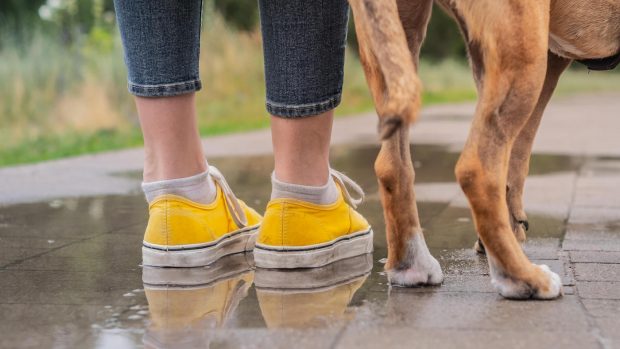My clients always tell me that their dog is eating grass because they need to make themselves sick. But it’s the biggest old wives’ tale there is – only a small proportion of dogs vomit after eating grass. Eating grass is a really common behaviour because dogs like the taste and it’s a good form of fibre, so if they are lacking fibre in their diet, they’ll eat grass to help them pass stools more readily.
Some suggest that they need chlorophyll, which is a green pigment found in plants and algae that is structured like haemoglobin, which carries oxygen throughout the body, aids healing and fights infection. It’s also known to break down calcium oxalate, which can cause bladder stones. Other theories state that dogs who eat grass are fulfilling their natural omnivore instinct and relieving boredom.
I like my theory and I like to think of it as dog chocolate. We know certain breeds of dogs have no “off switch” when it comes to food, so they just keep going until they are so full that they vomit. Some dogs may also eat grass to get a reaction from you – if you have continually pulled your dog away from a patch of grass, the restriction may encourage them to do it more as it is forbidden, although this is quite rare.
What to do if your dog eats grass
Firstly, make sure that all your dog’s nutritional needs are being met – just as you would if you dog was eating poop. If they are, you can calmly interrupt the grass eating behaviour by redirecting them to something else, perhaps by playing the “find it” game. I get my dog’s attention with chopped up cocktail sausages and then say, “are you ready”? Once I have eye contact, I throw the treats in different directions and ask them to “find it”.
This is a good enrichment tool, plus it’s great for bonding, redirecting and helps with recall, too. You’re also fulfilling their need to use their nose to scent and work. You can also time outings and being let out in the garden to happen after a meal. Your dog is safer eating grass in your garden than out and about as you will know that there are no chemicals or pesticides that could cause your dog harm if ingested.
Should you stop your dog eating grass?
There are several safety risks for dogs that eat grass regularly:
- Pesticides – these can poison your dog and cause excessive salivation, vomiting and diarrhoea.
- Contamination from other dogs and animals – for example, parvovirus, which is a serious gastrointestinal disease that can kill, is passed by the faecal to oral route.
- Internal parasites – grass can have eggs and larvae on them and can also carry the risk of lungworm, which can be passed on by slugs.
- Ticks, which carry Lyme disease and other diseases.
If your dog is a prolific grass eater, you will need to teach them to stop by introducing more enrichment and games on your walks. There may well be underling health issues to that may need veterinary attention.
When should I contact my vet?
If your dog continuously vomits or has diarrhoea after eating grass and is doing this regularly, then it would be wise to consult your vet to rule out any underlying conditions, such as gastroenteritis and pancreatitis. You should also contact your vet if you think your dog has consumed grass that has been treated with pesticides or other poisons.
You might also like:

How often do I need to worm my puppy?

Why does my dog eat poop?

How to master loose lead walking

No more yapping: how to stop a dog nuisance barking

How to stop a dog digging in the garden: advice from an expert

Simply delicious: the best natural dog treats

Subscribe to Horse & Hound magazine today – and enjoy unlimited website access all year round
Horse & Hound magazine, out every Thursday, is packed with all the latest news and reports, as well as interviews, specials, nostalgia, vet and training advice. Find how you can enjoy the magazine delivered to your door every week, plus options to upgrade your subscription to access our online service that brings you breaking news and reports as well as other benefits.




